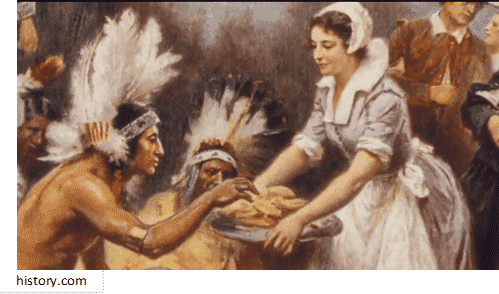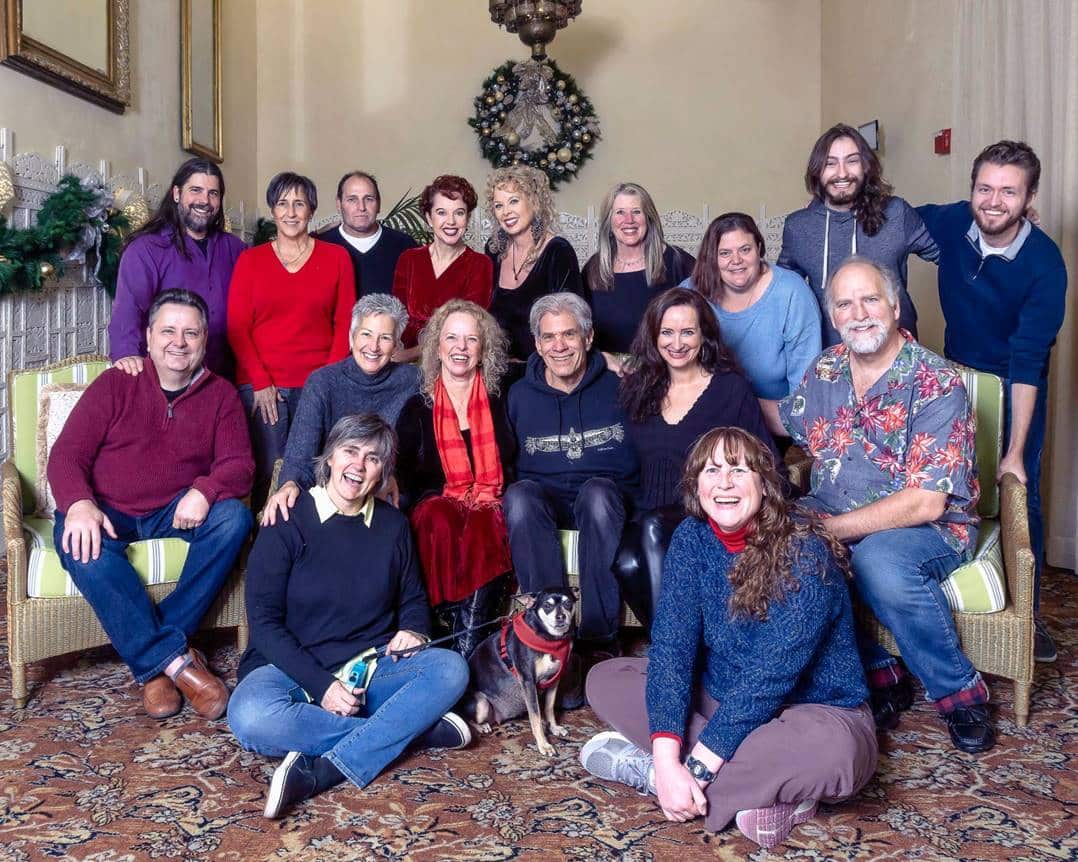Happy Thanksgiving from Donna, David, and all of us at Eden Method.
One rendition of the history of Thanksgiving:

Thanksgiving, for us, has traditionally been a time when we have gathered with our daughters, Titanya and Dondi, their partners, Jeff and Roger, and our young grandsons, Sequoia and Tiernan, to share a sumptuous meal and give thanks for the many blessings in our lives.
And then 2020 happened . . .
Donna sees the energy of 2020 as a time in which hard things come to the surface to be healed. It may take us a while to get there, but 2020 has put its foot down and said, “No more!” Our culture needs to heal, and we all need to dedicate ourselves to getting into alignment with the forces that are pushing toward healing and a new round of evolution in our collective consciousness. Good news is that these forces are much stronger than they seem when you are confronted daily with our political upheavals and divisions!
The U.S. holiday of Thanksgiving is rife with contradictions that are not unrelated to the nation’s political divisions. On the one hand, how beautiful to have a time of collective thanksgiving: a time to gather and savor family and loved ones; a time of appreciation that we were born into what has in many ways been the most successful, inspiring, and prosperous nation in history; a time of gratitude for those who created it; and a time for recognition that so many of us enjoy a way of life whose comforts and conveniences exceed the wildest dreams of royalty just a few hundred years ago! The beautiful imagery of Thanksgiving, centered around a rosy narrative of Pilgrims and Native Americans coming together to feast and give thanks, stimulates the pleasure centers of our brains.
Usually neglected in these celebrations, however, is recognition of the ghastly fact that the current social order traces to the way groups from Europe arrived and took over by committing horrific crimes against the Native American people. A compounding inconvenient truth is that we can’t change the past. In fact, we are all offspring of at least 40,000 years of history in which humanity moved forward based on who could conquer who – the cultural inheritance of the “law of the jungle.”
What is changing as the planet gets more crowded is a recognition that we are all in this together. A consciousness has been taking hold that makes one people’s subjugation or abuse of another abhorrent. It is collectively, though perhaps too slowly, dawning on us that worldwide cooperation is the only way humanity will survive. The history of “might makes right” that is ingrained in our DNA comes into direct conflict with this emerging, more socially advanced perspective, and that conflict forms the psychological underpinning of much of the cultural strife we are trying to navigate this very week of Thanksgiving 2020.
One Thanksgiving step we can take this year to exercise that more enlightened consciousness is—along with the family connections and shared appreciations and gratitude (perhaps needing to be celebrated via Zoom during the pandemic)—to also embrace the incredible spirit and legacy of the original dwellers of this land. We thought we’d share some resources for making that intention tangible.
1. Learn the history of Thanksgiving from a native perspective. Our history books tell the story of Thanksgiving from the perspectives of European settlers. That version is still taught in many pre-schools across America. A wonderful article in the Smithsonian Magazine tells the story from the perspective of the Wampanoag tribe of Plymouth.
Everyone's history matters: The Wampanoag Indian Thanksgiving story deserves to be known
2. Bring indigenous American food to the table. Indigenous cuisine includes many foods that you may already eat at the Thanksgiving table—squash, pumpkin, turkey, corn, and sweet potatoes. You can find out about the tribes in your area to see what’s local to your region.
If you’re looking for something truly authentic, Succotash was a Native American staple served as a stew of summer-fresh or winter-dried corn, making it a year-round choice for gatherings. The word showed up in print in 1751 from the Narragansett Indian term “misckquatash,” which meant “boiled whole kernels of corn” and referred to a simmering pot of corn to which other ingredients were added. Pots of early succotash could contain pieces of meat or fish.
Here’s a link to a Cherokee version of succotash, in honor of Donna’s great grandmother, who according to family legend was one-fourth Cherokee: www.culinaemundi.com/recipe/cherokee-style-succotash/
3. You can buy native this holiday season and support small native businesses. Here is a directory of online Native-owned companies. One of our favorites is Tashina Emery, whose hand-crafted jewelry, featuring natural materials, is inspired by the beauty of the Great Lakes region. Another is Gourd Jewels, featuring Hopi jewelry that reflects tribal symbols and traditions in its designs.
4. You might also consider donations to organizations such as Partnership With Native Americans, which supports hundreds of tribal communities and 250,000 native people each year to achieve short-term and long-term goals in the areas of education, food and water, holiday services, animal welfare, community building, and more.
Even though 2020 has been a difficult and painful time for many of us, at least enjoy the wordplay that “2020-vision” indicates good perspective. A true thanks-giving this year can be a savoring of appreciations, a reminder of what has gone right, and a reorienting toward a future that is rich with healing and a new embrace of all that is life-affirming about true inclusion. That could make America great again!
Wishing you peace, love, and gratitude,
Donna, David, and all of us at Eden Method.


Did you know that in addition to David and Donna's events, we also spread the word about other exciting talks, courses, and book releases occurring in the healing community? This includes events sponsored by such luminaries as Hay House and Mindvalley as well as exciting new movers and shakers in the industry! You can now select the emails you receive from us, including offers from our partners.
Click here to select your email lists.
Please note: If you unsubscribe, you will no longer receive ANY emails from us, including our monthly e-Letter, class notices, product announcements, certification notifications, etc. Rather than unsubscribe and miss it all, we encourage you to select the emails you want to receive.
